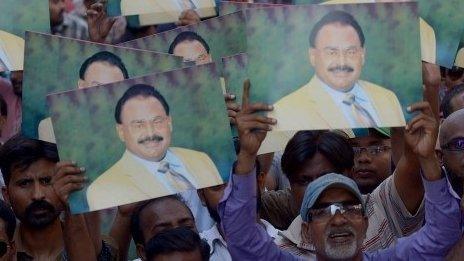Karachi MQM leader Altaf Hussain feels heat from military
- Published
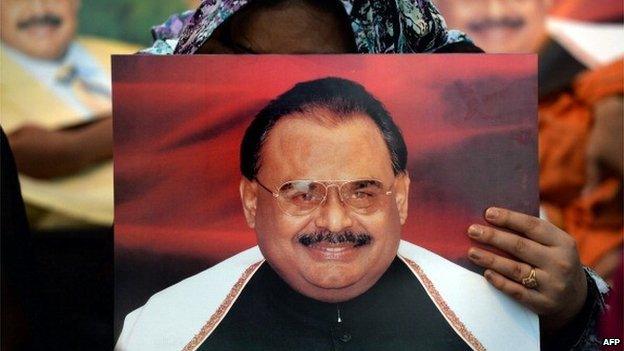
MQM leader Altaf Hussain has been living in exile in London for 23 years
For more than two decades, Altaf Hussain has controlled Pakistan's economic capital Karachi from his base in London. With the army now going after criminal elements in his Muttahida Qaumi Movement (MQM), could that be about to change, asks the BBC's Shahzeb Jillani.
On a pleasant Sunday evening in Karachi's Azizabad neighbourhood, groups of carefree children are hanging out on the streets - some playing cricket, others cycling around.
It could be any middle class locality in this city of 20 million. But this neighbourhood is home to the city's most powerful political leader, Altaf Hussain.
He has not set foot here in his modest house, known as Nine Zero, since he went into self-imposed exile to London 23 years ago as the authorities were preparing to crack down on his party.
But Mr Hussain is omnipresent here.
His house is well lit, well staffed and serves as the headquarter for tens of thousands of his party supporters.
His pictures hang from electricity poles. His MQM party's tricolour flags and its election symbol, a kite, decorate neighbourhood walls. Most of all, this is where everyone offers unquestioned loyalty to Mr Hussain, or bhai (brother) as they call him.
'Violent and abusive'
Earlier this month, the neighbourhood was under siege. On 11 March a heavy contingent of paramilitary soldiers, Pakistan Rangers, raided Nine Zero and the nearby party secretariat. The soldiers went door to door barging inside houses looking for suspected criminals.
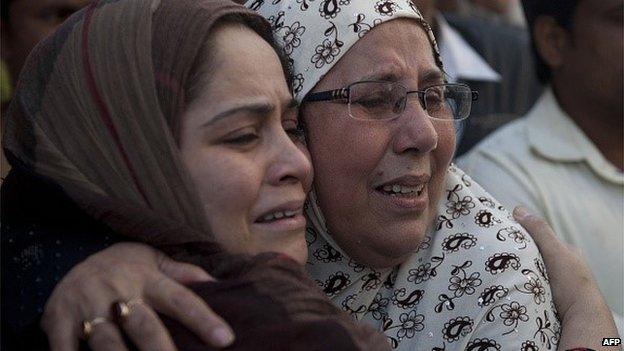
The family members of those arrested in the military raid on MQM said rangers were violent
At the end of it all, they claimed to have seized a large cache of arms and detained a number of wanted murderers, including a notorious hit man convicted in absentia for killing a journalist.
"They were violent and abusive," says a woman who lives nearby. "They trashed our place and took away my husband. My children were crying. I begged them to let go of my husband. The soldiers told me not to worry - they'll come back to take good care of me."
The Rangers operate under the authority of the federal government but are commanded directly by army officers. They are a well-funded law enforcement agency and usually operate independently of the police and the elected civilian government.
The raid at Nine Zero rattled the MQM leadership in Karachi and London. The Rangers said they moved on the basis of reliable inside information.
"It showed successful penetration of Pakistani intelligence agencies and exposed cracks inside the MQM," says a party insider.
Video 'confession'
The raid was the start of a string of blows the party has experienced this month. The same day, an anti-terrorism court announced that the MQM's most high-profile prisoner, Saulat Mirza, would be executed on 19 March.
Mirza had been on death row since 1999 for the murder of a senior government official in Karachi.
But hours before he was due to be hanged, a sensational video of him "confessing" was leaked to Pakistani news channels. In it, Mirza not only shows remorse for his crime, he accuses the MQM leadership of orchestrating the killing.
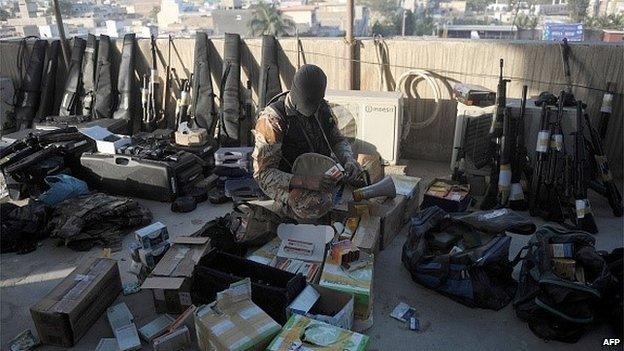
Pakistan Rangers say they found a large cache of arms inside MQM headquarters
Mirza said the order for the murder came directly from Altaf Hussain in London and it was conveyed to him at the home of an MQM parliamentarian in Karachi. Mirza's execution has since been put on hold - it is not clear for how long.
It is not known where or when the video was filmed. But most people suspect it was the work of Pakistani intelligence seeking to pile yet more pressure on the MQM leadership.
Experts say the "confession" has no legal value.
It was filmed, released and aired as a part of the psychological warfare between the army and the party, analysts say.
'Reign of terror'
It provided ample ammunition to detractors of the MQM who have long denounced the party for its alleged "reign of terror" in Pakistan's financial capital.
The MQM denied the accusation, saying it was all part of a conspiracy to push the party against the wall, yet again.
Over the decades, the Pakistani army has enjoyed a love-hate relationship with the MQM.
Some army chiefs, like the former President General Pervez Musharraf, promoted the party for their political aims. Others believed the party had become too powerful and had to be tamed by use of force.
Pakistan's current army chief, Gen Raheel Sharif, says he is committed to tough action against all violent groups, be they militants in the tribal north-west or militants in the political parties of Karachi.
His approach to sorting out the lawless in Karachi is said to be informed by the director general of the intelligence service ISI, Lt Gen Rizwan Akhtar.
Playing it cool
Before being promoted to the powerful post in September 2014, Gen Akhtar served as the head of Pakistan Rangers in Karachi.
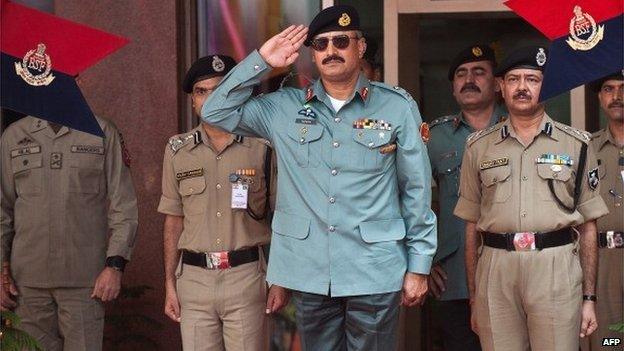
Gen Rizwan Akhtar, it is believed, is guiding the approach to dealing with the lawless in Karachi
In that capacity, he approved "targeted raids" against militants. During this time, he is said to have formed strong views about the complicated dynamics of political violence in Pakistan's biggest city.
His blunt assessment, it is believed, was that to sort out Karachi, you first have to sort out the MQM.
The MQM has faced violent military operations, and attempts to split the party before. In the past, it retaliated with violence and shutting down the city. But not this time.
Except for some emotional outbursts by Mr Hussain criticising the army, this time the response has been rather timid and clearly non-violent.
In fact, the party has gone so far as to say it actually supports the latest army action, but that it should be across the board and not politically motivated.
The party has been forced to play it cool because it is determined to avoid a bigger confrontation with the army.
'In disarray'
The response also stems from a clear realisation that the party has lost a lot of ground over the years. It has tried to reposition itself as a liberal, progressive party that has been most vocal against Taliban militancy and Islamic extremism. But that has had limited impact.
Back in London, party leader Altaf Hussain is already under pressure from the British government, facing a variety of allegations and an investigation into money laundering. Last year, he was briefly detained for questioning by British police. His health is also suffering.
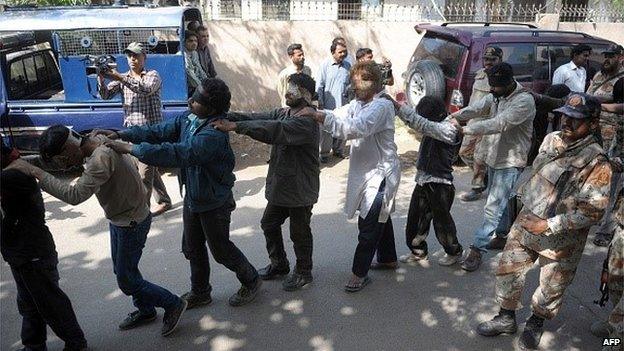
Some say without Altaf Hussain the party would not exist in its current form
"The party is in a disarray," concedes a senior MQM leader. "We are still trying to figure out what this stand-off with the army means for the future of the party."
Some fear the army's latest confrontation could be the start of a bigger project to cleanse Pakistani politics of corrupt and criminal leaders. More specifically, some believe it is about persuading Mr Hussain to quit the party leadership.
It apparently stems from the belief that for the MQM to carry on as a purely political national party, Altaf Hussain must go.
"I have done everything I could to get along with this army. But they have never liked my face," Mr Hussain recently complained in a telephone address to party workers.
Like most of Pakistan's political parties, the MQM does not have a democratic mechanism for changing its leader.
Altaf Hussain has remained leader since founding the party. Potential challengers were removed, sometimes physically.
"If anyone thinks MQM is possible minus Altaf Hussain, they are living in a fool's paradise," says a senior party leader. "[If that ever happens] this party will disintegrate into smaller groups and other, possibly more lethal, groups could fill the vacuum."
- Published11 March 2015
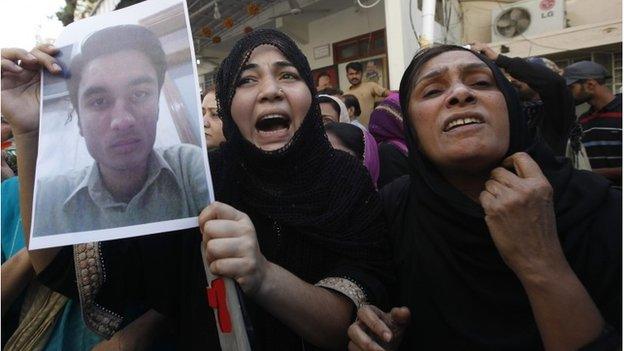
- Published3 June 2014
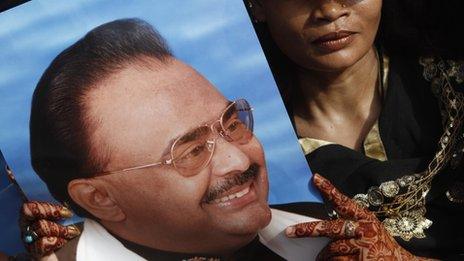
- Published3 June 2014
